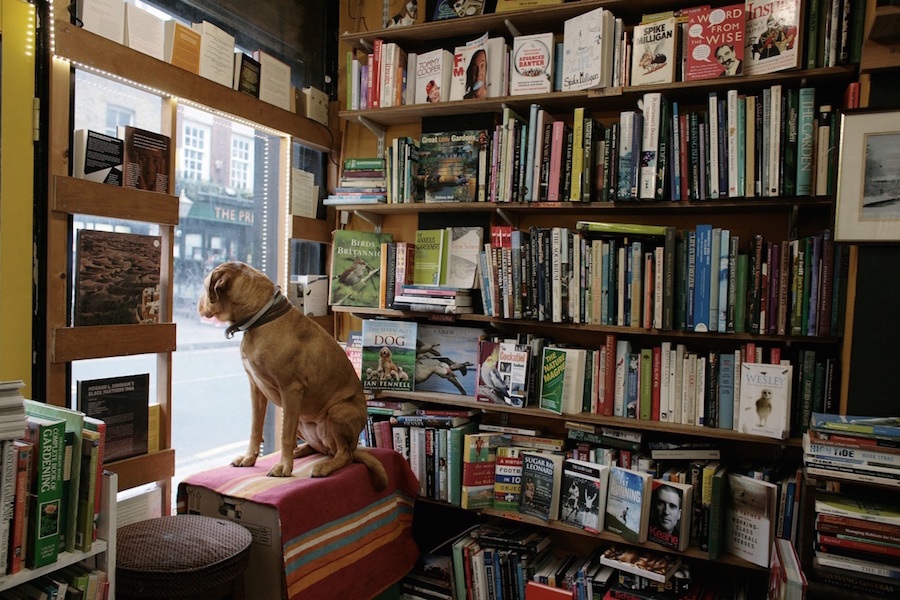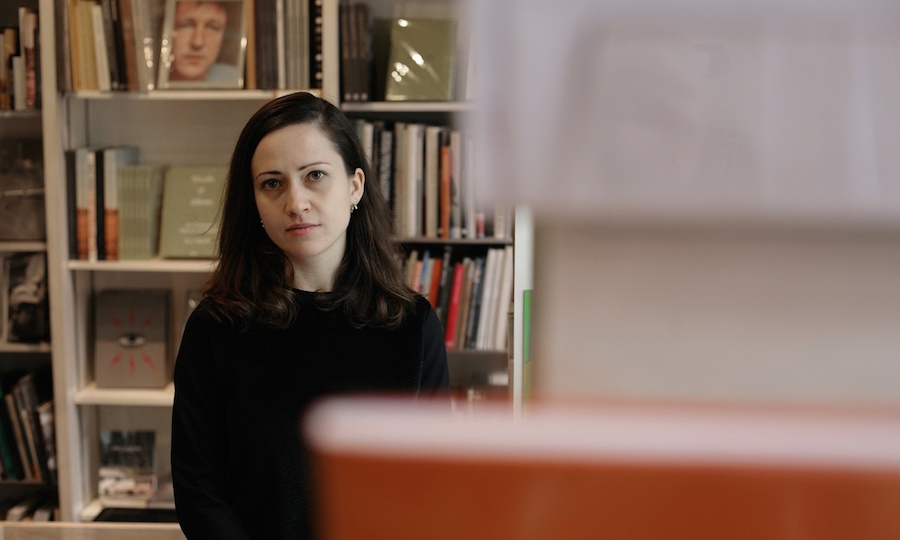Driven from the city by rising rents and online competition, a little over 100 independent bookstores remain. How much of the capital’s character is being lost with the closure of these cultural institutions?

Book Mongers in Brixton, south London, has been a fixture on Coldharbour Lane for more than two decades. At midday on Saturday the second-hand bookshop is packed, and the sound of friendly chatter – and barking – syncopates with the blues music that fills the air. A golden-yellow dog stands guard at the window, greeting familiar faces as they arrive.
“This shop is a Brixton institution,” says Matthew, relaxing on the shop’s old emerald sofa. Local writer Howard Cunnell – here with his daughter Daisy – describes it as a “meeting place for exasperated middle-aged radicals”, while local artist and sculptor Matthew Rugg calls it “the best serendipity bookstore in town”.
Book Mongers is one of just 987 independent bookstores left throughout the UK. In the last decade, one third have shut down due to rising high-street rents coupled with the growth of online retailers, and the casualty rate has been particularly high in London.

Charing Cross road was once a mecca for booksellers including Murder One, the crime and mystery bookshop. In the 1950s writers such as Dylan Thomas bounced from bar to bookshop, but rent hikes soon pushed the independent owners out, and the 2008 recession forced other long-standing institutions such as Langton’s Bookshop in Twickenham to close. So what of London’s character has been lost along with its independent bookshops?
From our partners:
“The streets of the modern city can feel like a desert, with people rushing about but never meeting,” a wispy-haired former teacher tells me (he prefers not to give his name). “In this environment, the friendly, slightly eccentric local bookshop is an oasis.”
The aforementioned Matthew, a south London resident since 1981, agrees that the city can be lonely. He complains about modern shop assistants and other service staff, who hurry to deal with your request rather than wanting to engage with customers. His closest friends have now left the area after being evicted from social housing, but at the Book Mongers he still sees old faces and there’s always time to talk and engage in political debate. “It’s like a little sanctuary,” Matthew says.
London used to be made up of neighbourhoods with distinct identities. With all its quirkiness – including south London’s most famous dog – Book Mongers acts as a reminder of how the area used to be. “It’s more like ‘old Brixton’ in here, not completely tidy and clean” says Matthew. “There’s no branding; it’s not like it’s pretending to be independent as an image thing.”
The question of local identity is just as important in central London. Claire de Rouen is one of the few new independent booksellers to open on Charing Cross Road in the last decade, and its co-owner Lucy Moore laments the changes in the area. “It’s not to do with nostalgia but I am aware that we don’t have this great art school [Central Saint Martins] down the road any more, nor all these amazing independent businesses. The only businesses thriving now are bars and restaurants.”

With the loss of local amenities, like local bookshops, which do not make much money but add cultural value, creativity often flees too. Moore observes that artistic people are leaving for regional towns: “That’s great for those places but London’s loss … the capital will soon cease to be an interesting place to live.”
Claire de Rouen held a free reading group for two hours the previous night, at which two academics talked about photography theory. “That doesn’t happen much anymore, certainly not in central London,” Moore says.
“The bookshop has always been at the heart of the modern city; it is its imagination, its conscience and spirit,” says Dan Lewis marketing manager at Stanfords, an independent travel bookshop. “From their first incarnation as printers of pamphlets, they were always where people would go to explore ideas, find stories and share opinions.”
“The streets of the modern city can feel like a desert … the friendly, slightly eccentric local bookshop is an oasis”
Lewis says that while today, people may have these conversations and make discoveries online, the best bookshops have the ability to bring the people of London together physically as centres of culture.
Not everyone is convinced these shops are in decline, however. Sheryl Shurville, co-owner of two bookshops outside the capital in Buckinghamshire and Rickmansworth, has never been busier. “We have enhanced the experience of reading by providing exciting events. Lots of people love to meet an author, go out for an evening, have a live and interactive experience,” she says. “My advice to other bookshops would be to take the books out into the community and don’t wait for people to come to you.”

Brett Wolstencroft, a manager at Daunt Books, is also positive about the future, saying that bookshops must adapt and offer a range of events to survive as friendly and attractive places to visit. “If you employ a good bookseller in the shop for around five to 10 years, that repays tenfold; a good independent store always understands that.”
But Wolstencroft acknowledges that the issue of rent rises is a real concern in London, and something booksellers have little control over. “The upwards-only nature of rent-reviews means that you don’t get the benefit of lower rents during tougher times and then, as you start to recover, you are quickly hit by rapid rises.”
Back in Brixton, Howard Cunnell remarks that the type of people now moving in to south London “are not interested in the history of the place”. He adds that there is real authenticity to independent retailers such as the Book Mongers. “That is irreplaceable; an estate agent is replaceable but if a place like this goes, it’s not coming back. Once it’s gone we lose a great intellectual and social resource.”
His daughter Daisy says the familiar smell of old books is what she remembers most from her childhood. This bookstore is her second home in the city. “Saturdays involved egg and chips and then a visit to the shop to browse. My dad would be chatting while I looked at books and my brother at comics. It’s a safe place here – like being in a bubble.”
This feature originally appeared in The Guardian.

















